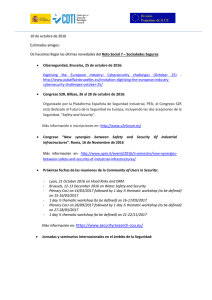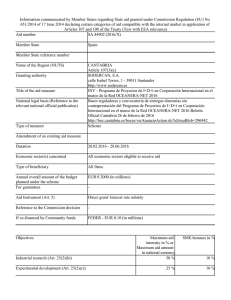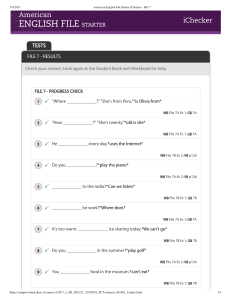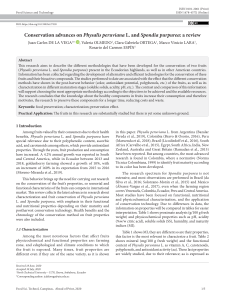Timetable and four scenarios for the UK leaving the
Anuncio
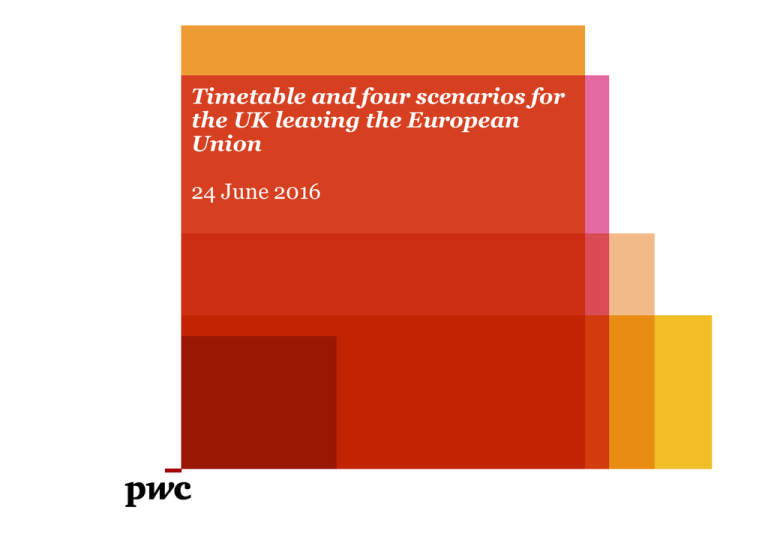
Timetable and four scenarios for the UK leaving the European Union 24 June 2016 Leaving the European Union will be a process not an act. Our analysis suggests a long period of adjustment. Brexit related events Q3/4 2016 Referendum on the fate of the UK’s membershipof the European Union. The UK public votes for ‘leave’-ing the EU. 2016 Jun Jul Aug Sep Oct Nov Dec It is likely that the negotiations on the UK’s future relations with the EU will continue for more than two years. The timings of this are uncertain but could last from 5-10 years. The UK would also have to pursue a number of free trade agreements with its key trading partners which will take time. UK Government notifies the European Council of its intention to leave the EU Scotland calls for a referendum to exit the United Kingdom 23 June 2016 2019 and Beyond Q1/2017 Q3/4 2016 Informal negotiations begin between the UK and its European partners on the form of Brexit Q2/3 2017 Negotiationsbegin between the European Counciland the UK on Brexit. Potential for formal discussionswith individual members statesto strike bilateral deals 2017 Jan Feb Mar Apr May Jun Jul Aug Sep Oct Nov Dec 2018 Jan Feb Mar Apr May Jun Jul Aug Sep Oct Nov Dec 2019 2020 Jan Feb Mar Apr May Jun Jul Aug Sep Oct Nov Dec July 2016 Political events in the EU Slovakia takes on presidency of EU council March 2017 ECB quantitative easing set to end Jan 2017 Malta takes on presidency of EU council Q2 2017 France presidential election Q4 2017 Germany parliamentary election Jan 2018 Estonia takes presidency of EU council July 2018 European elections Q4 2019 Spain General Election July 2019 July 2017 UK takes on presidency of EU council May 2019 Bulgaria takes on presidency of EU council Jan 2019 Q2 2018 Italy General election Austria takes on presidency of EU council Romania takes on presidency of EU council Key unknowns: UK Parliament reaction to the vote to leave, EU response to UK demands post Brexit, geopolitical and economic events PwC Q2 2020 UK General Election We have identified four possible scenarios following the vote to Leave the EU Referendum Multiple scenarios could unfold depending on how the UK parliament and the EU react to the result of the Referendum and subsequent negotiations. We have identified four base-case scenarios that capture the different degrees of integration that the UK may have with the EU in the future. The scenarios could take different specific forms, but those considered in most of the existing evidence have broadly coalesced around one of the following scenarios. “Leave” scenarios Potential implications Situation Free trade agreement (FTA) PwC No access agreement (WTO/MFN) EEA member (Norwegian option) Bilateral agreement (Swiss option) UK negotiates a Free Trade Agreement (FTA) with the EU The UK remains part of the EEA and keeps the four freedoms of labour, capital, goods and services The UK enters into a bilateral integration treaty with the EU The UK does not establish any new trade agreements with the EU Tariff-free trade between the UK and the EU in goods (but not services). UK grandfathers all existing FTAs between the EU and third-party countries UK will need to make a substantial contribution to the EU budget and comply with EU social, employment and product regulation UK would have access to some areas of the Single Market, at the cost of adopting the relevant EU regulations Only WTO terms are still applied – UK goods and services would be treated in the same way as American ones in the EU Exiting the EU could lead to greater autonomy in external trade policy, but also a loss of influence over shaping future EU regulations UK-EU Free trade agreement (FTA) EEA member (Norwegian option) Bilateral agreement (Swiss option) No access agreement (WTO / MFN) Degree of disruption to economy Medium Low Medium High Access to single market Medium - UK would retain free trade in goods with the EU, but non-tariff barriers such as divergence in standards and regulations could emerge High – EEA countries have access to the Single Market Medium – the Swiss agreements cover trade in goods but not in services. Low Influence over EU regulations No Some – no voting rights but limited formal engagement. Some autonomy in other areas. No No Application of EU regulations and directives The UK would have to comply with EU regulations around the goods covered by the FTA Yes, including social and labour law (Working Time Directive) Technically no, but required in practice if domiciling in other territories (e.g. Swiss banks operating out of UK) Technically no, but limited discretion in reality if third country equivalence is required Contribution to EU budget No Yes, but smaller Yes, but smaller No Independent immigration policy Yes No – all four freedoms retained Some autonomy, but Switzerland cannot restrict EU immigration Yes Independent trade policy Yes – UK may negotiate free trade agreements (FTA) with other countries Yes – UK may negotiate free trade agreements (FTA) with other countries Yes – UK may negotiate FTAs with other countries Yes – UK may negotiate FTAs with other countries in FS and other services Key Impact PwC Negative Neutral Positive This publication has been prepared for general guidance on matters of interest only, and does not constitute professional advice. You should not act upon the information contained in this publication without obtaining specific professional advice. No representation or warranty (express or implied) is given as to the accuracy or completeness of the information contained in this publication, and, to the extent permitted by law, PricewaterhouseCoopers LLP, its members, employees and agents do not accept or assume any liability, responsibility or duty of care for any consequences of you or anyone else acting, or refraining to act, in reliance on the information contained in this publication or for any decision based on it. © 2016 PricewaterhouseCoopers LLP. All rights reserved. In this document, “PwC” refers to PricewaterhouseCoopers LLP which is a member firm of PricewaterhouseCoopers International Limited, each member firm of which is a separate legal entity.
